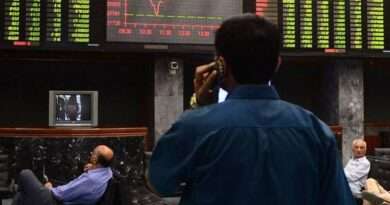IMF Condition and Dollar Overvaluation in Pakistan’s Economy
|
Getting your Trinity Audio player ready...
|
The impact of the International Monetary Fund (IMF) conditions on Pakistan’s exchange rate policy has sparked intense debate in recent years. The IMF’s requirement for a market-based exchange rate over the past two years has left the US dollar overvalued, a situation that has led to inflationary pressures and higher interest payments. According to Tola Associates, a tax advisory and consultancy firm, the rupee could have been stronger by Rs67 against the dollar, reducing inflation and increasing fiscal space for economic growth. However, despite these claims, the central bank insists that the current exchange rate aligns with market expectations.
IMF’s Influence on the Rupee-Dollar Exchange Rate
Over the past two years, the IMF has mandated that Pakistan adopt a market-based exchange rate. This requirement has led to a situation where the value of the US dollar is seen as inflated, directly affecting the economy in several negative ways. According to Tola Associates, the rupee-dollar exchange rate could have stood at Rs211.5 by the end of October 2023 if not for the IMF’s conditions. This suggests that the rupee is undervalued by approximately 24%, or Rs67, compared to the dollar’s actual market value.
The Impact of the Exchange Rate on Inflation and Economic Stability
The effects of an overvalued dollar are far-reaching. One of the most significant consequences is the increased inflationary pressures that have burdened the Pakistani economy. Higher inflation means higher prices for basic goods and services, reducing the purchasing power of the general population. Moreover, Pakistan’s debt obligations, particularly foreign debt, become more expensive to service when the exchange rate is higher than the market-based rate.
Tola Associates claims that if the rupee were allowed to trade at its estimated real value of Rs211.5 to the dollar, Pakistan could have experienced a deflationary trend instead of the 8.7% inflation seen in the first quarter of the 2023-24 fiscal year. This deflation would have had several positive effects, including a reduction in interest rates, which could have fallen to below 2%. Such a shift would create fiscal space for the government, potentially saving up to Rs6.4 trillion, a significant amount that could be allocated to development and economic growth.
How the Overvalued Dollar Affects the Government’s Budget
The overvaluation of the dollar impacts Pakistan’s government budget in several ways. One of the primary ways it affects the fiscal policy is by driving up interest payments on domestic debt. As inflation rises, the government must increase interest rates to keep pace with inflationary pressures. This results in higher domestic debt repayments. According to Tola Associates, a 1% decline in the interest rate would reduce the domestic debt repayment by Rs475 billion in the current fiscal year alone.
Moreover, with the dollar overvalued, Pakistan’s imports become more expensive, leading to an increased current account deficit. This exacerbates the pressure on the country’s foreign exchange reserves and further intensifies the external debt burden.
The IMF’s Goals for Pakistan’s Monetary Policy
The IMF’s loan program is focused on implementing monetary policies that bring inflation under control while enhancing the competitiveness of Pakistan’s economy. The IMF has emphasized the need for an “appropriate” exchange rate policy, which would allow for flexibility and enable the currency to act as a shock absorber. This flexibility would ideally improve Pakistan’s balance of payments by making exports more competitive and helping to rebuild foreign exchange reserves.
In contrast, critics of the IMF’s policies argue that the current exchange rate regime is flawed, leading to artificial exchange rate distortions. For instance, the Pakistan rupee has been trading at over Rs278 to the dollar for the 2023-24 fiscal year, which many believe is an artificial level maintained to comply with the IMF’s requirements.
Finance Minister’s Stance on the Exchange Rate
Ishaq Dar, Pakistan’s finance minister, has been vocal in his opposition to the flexible exchange rate regime. He argued that the Pakistani rupee should not be valued beyond Rs240 to the dollar, given the country’s economic fundamentals. He has expressed his belief that a higher exchange rate contributes to inflation, increases the burden of external debt, and harms the public’s purchasing power.
Dar’s comments come after the rupee value plummeted from Rs238 to Rs218 during his first week as finance minister. He attributes this sudden depreciation to the lack of economic fundamentals that justify such a significant change in the exchange rate.
Real Effective Exchange Rate (REER) and Its Role
The Real Effective Exchange Rate (REER) is an important metric that adjusts the nominal exchange rate to account for inflation. The REER provides a clearer picture of the real value of a currency compared to other currencies, factoring in inflation differentials. According to Dar, the REER for September indicated that the exchange rate should fall within the range of Rs235 to Rs240 per dollar. This suggests that the rupee is significantly undervalued compared to its true economic value.
The Role of the Central Bank in Exchange Rate Management
Despite the IMF’s insistence on a market-based exchange rate, the central bank of Pakistan has been managing the exchange rate in a way that some argue is beneficial for the country’s short-term economic goals. In particular, the central bank has been buying US dollars from the open market, which helps maintain foreign exchange reserves in the absence of major foreign debt-related inflows.
In the last fiscal year, the central bank purchased over $6 billion from the market, a strategy that has been made possible by the undervaluation of the rupee. In July alone, the central bank bought about $722 million. While this strategy helps bolster reserves, it also raises questions about the sustainability of the current exchange rate regime.
Future Outlook: Will Pakistan Continue to Follow IMF Conditions?
As Pakistan continues to follow the IMF’s exchange rate policy, the country faces a challenging road ahead. The overvalued dollar has contributed to inflation and higher debt repayments, making it difficult for the government to stabilize the economy. Critics argue that the policy hurts ordinary citizens and increases the cost of living. The government, however, insists that the IMF’s approach is necessary to restore Pakistan’s financial stability in the long run.
Conclusion: The Road Ahead for Pakistan’s Currency Policy
Pakistan’s currency policy remains a point of contention between policymakers, the IMF, and economic experts. While the IMF’s conditions have led to an overvalued dollar, which has negatively affected inflation and interest payments, proponents argue that the policy is essential for stabilizing the economy. As Pakistan navigates these challenges, the real question is whether the IMF’s market-based exchange rate can provide the long-term stability the country needs or whether a new approach is required.
FAQs
1. Why is the rupee-dollar exchange rate important for Pakistan’s economy?
The rupee-dollar exchange rate is crucial as it influences inflation, interest rates, and Pakistan’s external debt obligations. An overvalued dollar increases inflation and makes debt servicing more expensive.
2. What is the IMF’s role in Pakistan’s currency policy?
The IMF has mandated a market-based exchange rate for Pakistan, which means that the value of the rupee should be determined by supply and demand in the foreign exchange market.
3. How does the overvaluation of the dollar affect inflation?
An overvalued dollar leads to higher import costs, which in turn raises the prices of goods and services in the country, causing inflation.
4. What is the Real Effective Exchange Rate (REER)?
The REER is an inflation-adjusted measure of a currency’s value compared to other currencies. It provides a more accurate reflection of a currency’s competitiveness.
5. Can Pakistan’s currency policy change without the IMF’s involvement?
Changing Pakistan’s currency policy without IMF involvement would require significant adjustments to the country’s monetary policy and potentially affect its financial stability
ALSO READ:
https://skipper.pk/2024/12/05/barclays-settlement-debt-sale-violations/




